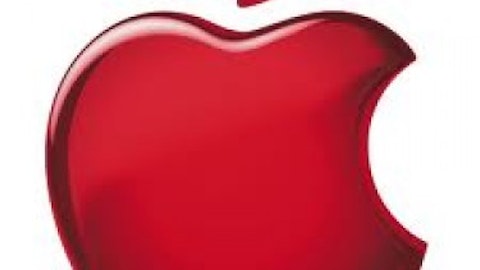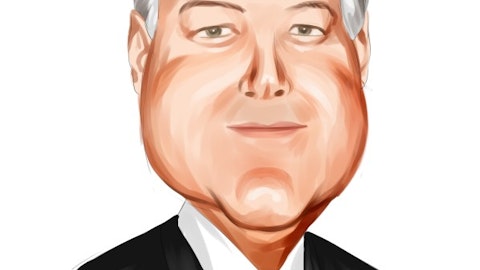At a time when many retailers are in a flux and are faced with uncertain futures, Staples, Inc. (NASDAQ:SPLS) is one of the most underappreciated stocks in the industry, offering investors a robust dividend yielding 3.7%. Much of the industry’s weakness, including Staples’ – down 15% year to date – is a product of online e-commerce competition, high unemployment, and tight credit.
One positive for the industry is the expected increase in consumer U.S. spending of 2.4% in 2013 after a 1.9% increase in 2012. In general, specialty retailers face greater volatility than consumer staples-based retailers, but in a rising economy, the former tends to provide greater upside. Staples calls billionaire Ray Dalio as one of its big name shareholders (see what else Ray Dalio is buying).
Staples expects sales to be relatively flat in FY2013 as the electronics and office supply store looks to reduce square footage in and effort to boost overall profitability. This should only assist with further bolstering its solid balance sheet and robust cash flow generating capabilities.
Other notable electronics and office-focused retailers that are competing with Staples includes Office Depot Inc. (NYSE:ODP), Best Buy Co., Inc. (NYSE:BBY), OfficeMax Incorporated (NYSE:OMX), and RadioShack Corporation (NYSE:RSH). Office Depot has seen positive reinforcement from top shareholder Starboard Value, a fund that has made several insider purchases of late. This office supply store is one of Staples’ smaller competitors with a sub-$1 billion market cap. Although Office Depot has missed earnings each of the last four quarters, it has managed to grow its stock price 60% year to date. Billionaire D.E. Shaw is one of Office Depot’s top name shareholders with nearly 1 million shares at the end of last quarter (see D.E. Shaw’s newest picks).
Best Buy, meanwhile, has been beaten down this year as it faces some of the most robust pressure from online e-commerce companies, mainly Amazon. Best Buy missed earnings by at least 30% in each of the last two quarters, and despite speculation that founder Richard Schulze might make a bid for the company, it still trades at its lowest levels since 2000. Best Buy pays the highest dividend of the five retail stocks listed here, at a 4.8% yield, but its deteriorating cash position might cause concerns for a possible dividend cut. Billionaire Ken Griffin – found of Citadel Investment Group – sold off over 90% of his Best Buy shares in 3Q (see Ken Griffin’s other bold moves).
OfficeMax is expected to post a decline in 2012 sales, at 1.2%. The company has been closing underperforming stores in an effort to cut costs, and like counterpart Office Depot, has managed to push its stock price up over 60% year to date. Billionaire Steve Cohen of SAC Capital made a big bet on OfficeMax last quarter (check out Steven Cohen’s top picks).
Last but certainly not least, RadioShack trades at the lowest market value of our five stocks at just over $200 million, making it an interesting takeover candidate. Adding to this is the fact that the stock is down over 75% year to date. The electronics company is seeing similar weakness to that of Best Buy and suspended its dividend earlier this year. RadioShack also saw billionaire investor Jim Simons dumping all his shares in 3Q (check out Jim Simons’ other stock picks).
From a valuation and dividend-paying standpoint, we believe Staples is the most attractive pick of the bunch. Staples has managed to grow its dividend the most over the last five years at 9%, beating out the other dividend-paying retailers OfficeMax and Best Buy. Expected earnings growth metrics for the next three years put Staples (7.4% CAGR) and Best Buy (6.5% CAGR) at the top of heap; the other retailers mentioned above are expected to see negative growth.
Thus, we can see that Staples and Best Buy are the clear industry giants, but Staples stands above Best Buy on a balance sheet and dividend-paying basis. Staples has a debt to equity ratio of only 27%, compared to Best Buy at 57%. In terms of cash flow from operations, Staples’ payout is only 33%, while Best Buy has paid out well in excess of its entire cash flow over the last twelve months.
In short, we believe that Staples is a standout in the office products segment, while giving investors a solid dividend. The key to the retail industry is that there are still consumers who are more intrigued by actually viewing and testing products before buying. There has been much speculation on whether or not these consumers still exist, but now they are using the brick-and-mortar stores as a showroom, so to speak, for lower-priced online retailers.
Obviously, this is one of the biggest issues going forward for Staples, as it must convert these visiting shoppers to actual paying customers. Even so, Staples still has a leg up over top rival Best Buy, given that many of its products are not major purchases, and it provides less of a price difference between in-store and online goods. Interestingly, two of our five retail stocks discussed here are also in our list of top stocks in the hedge fund industry (see our entire Top Ten here).






